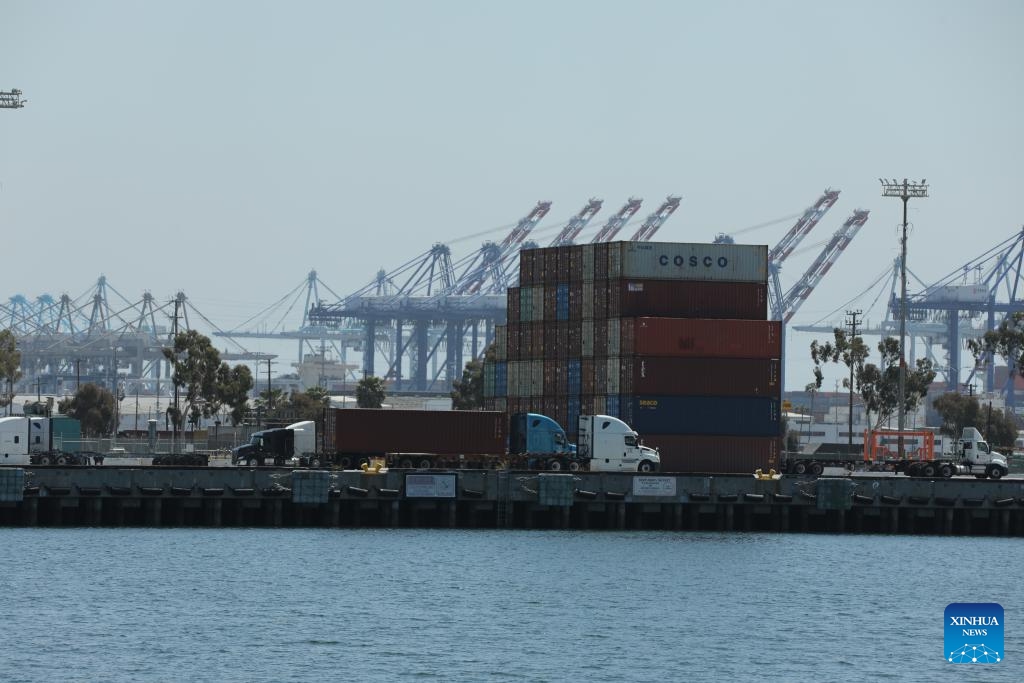Some US small businesses welcome recent tariff reductions, but still concerned about remaining duties, uncertainties

Trucks and containers are pictured at the Port of Los Angeles, California, the United States, on April 29, 2025. (Photo/Xinhua)
Several US small business owners with trade ties to China told the Global Times that they welcome the recent agreement between China and the US to remove or suspend hefty tariffs on each other's goods, which some say are "incredibly damaging." However, some are still concerned about the still-high remaining tariffs and lingering uncertainties.
"The tariffs have had a deeply negative impact on my business," Kari Tribble, owner of Avari Beauty, an esthetician salon and beauty brand based in the Twin Cities, in the US state of Minnesota, told the Global Times, pointing to a recent $300 package of beauty products that would have cost her an additional $435 due to the 145 percent tariff.
In a positive turn, China and the US, following a high-level economic and trade meeting in Switzerland last week, have moved to remove 91 percent of additional tariffs on each other's goods and suspend 24 percent tariffs for 90 days, as they agreed to continue talks.
Tribble said that this is a "step in the right direction," although she remains concerned about the uncertain situation and profound damage caused by the tariffs on her business.
"Unless the US improves its manufacturing infrastructure and lowers domestic production costs, I don't believe manufacturing here will be a realistic option for many small businesses," Kari said, adding that the US-started trade war has already harmed countless small businesses and farms across the country.
Avari Beauty is just one of many US small businesses that have been hurt by the US-initiated tariff war.
"While the temporary decrease in tariffs is helpful - 30 percent is far better than 145 percent - there are still unintended consequences such as freight shipping rates that will skyrocket for the rest of May," Jamie Stegmaier, co-founder of Stonemaier Games, a tabletop game publisher with eight US employees based in St. Louis, told the Global Times.
Instead of storing completed products in China, the company has begun to ship them to the US. According to Stegmaier, his company has 250,000 units of products that began production in early 2025.
"I believe these tariffs are incredibly damaging for any business that sells in the US, as the tariffs act as a huge tax we must pay to bring our products into the US," he said, adding that "I feel like the tariffs were made without consideration for US businesses and without acknowledging the positive impact of a global economy."
Steve Greenspon, CEO of Honey-Can-Do International, a US-based provider of home storage, organization, and laundry care products sold through retailers, also told the Global Times that "the 30 percent tariff is better than 145 percent, but it's still significant. This is on top of other tariffs that were previously in place from China."
According to Greenspon, the lingering uncertainty makes it impossible for US companies to plan ahead. "We don't know what will happen after the pause with China or other countries. We cannot make the investments necessary to adapt, as we don't know what the rates will be and where to go. We are not able to move these low-cost household goods to the US," he said.
Such concerns are also reportedly shared by many other US businesses. On Tuesday, five US small businesses asked a US court to halt the US administration's so-called "Liberation Day" tariffs, arguing that the administration overstepped its powers by declaring a national emergency to impose across-the-board taxes on imports from nations that sell more to the US than they purchase, Reuters reported.
The administration's imposition of the tariffs on April 2 "represents and unprecedented and unlawful expansion of executive authority," Jeffrey Schwab, a lawyer representing the plaintiffs, told a three-judge panel of the New York-based US Court of International Trade, according to Reuters.
On May 1, the US Chamber of Commerce said that it has sent a letter to the US administration, asking it to address the impacts of tariffs by granting automatic exclusions for any small business importer, establishing a process for companies to apply for an exclusion if the company can demonstrate that tariffs pose a risk to employment for American workers, and providing exclusions for all products that cannot be produced in the US or are not readily available, according to a statement on its website.
Photos
Related Stories
- Ocean shippers raise prices within 24 hours of China-US announcement to slash tariffs: industry observer
- China urges U.S. to stop Section 232 tariffs: spokesperson
- Chinese, US tariff adjustments take effect; Ports, exporters witness rapid trade rebound
- Practitioners of Peace: Ordinary Chinese people risk to rescue US pilots, UK POWs in WWII, forging decades-long friendships
- Chinese cargo shipments to US surging, as buyers rush to place orders amid tariff reduction: businesses
Copyright © 2025 People's Daily Online. All Rights Reserved.









